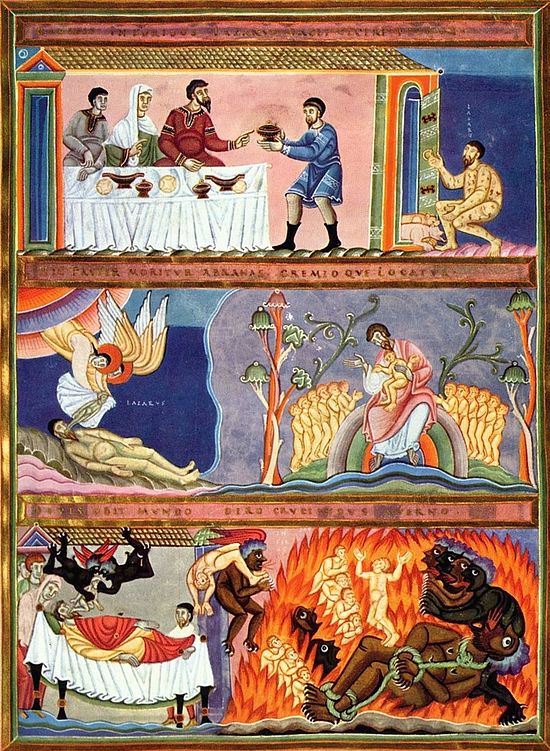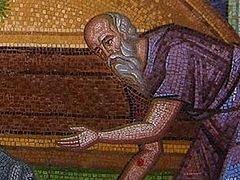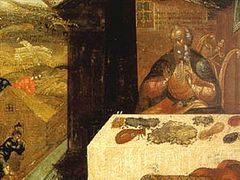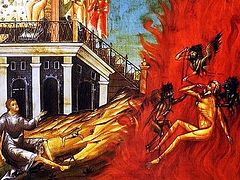 The Rich man and Lazarus, illumination, Meister des Codex Aureus Epternacensis 001. Wikipedia.
The Rich man and Lazarus, illumination, Meister des Codex Aureus Epternacensis 001. Wikipedia.
There was a certain rich man, which was clothed in purple and fine linen, and fared sumptuously every day: And there was a certain beggar named Lazarus, which was laid at his gate, full of sores, and desiring to be fed with the crumbs which fell from the rich man's table: moreover the dogs came and licked his sores. And it came to pass, that the beggar died, and was carried by the angels into Abraham's bosom: the rich man also died, and was buried; and in hell he lift up his eyes, being in torments, and seeth Abraham afar off, and Lazarus in his bosom. And he cried and said, Father Abraham, have mercy on me, and send Lazarus, that he may dip the tip of his finger in water, and cool my tongue; for I am tormented in this flame. But Abraham said, Son, remember that thou in thy lifetime receivedst thy good things, and likewise Lazarus evil things: but now he is comforted, and thou art tormented. And beside all this, between us and you there is a great gulf fixed: so that they which would pass from hence to you cannot; neither can they pass to us, that would come from thence. Then he said, I pray thee therefore, father, that thou wouldest send him to my father's house: For I have five brethren; that he may testify unto them, lest they also come into this place of torment. Abraham saith unto him, They have Moses and the prophets; let them hear them. And he said, Nay, father Abraham: but if one went unto them from the dead, they will repent. And he said unto him, If they hear not Moses and the prophets, neither will they be persuaded, though one rose from the dead.
Always hungry, the suffering Lazarus wished to eat if only the crusts that fell from the rich man’s table, the ones that were thrown to the dogs before his very eyes, but apparently not even those were made available to him. No one pitied his sickness, no one bandaged his wounds, and the dogs licked them, which prevented them from healing. The unfortunate man died, the rich man also died, and after death their positions reversed. Each received his reward—Lazarus was carried up by angels to paradise, and the rich man was cast into hell. The rich man in his terrible torments remembered his wasted life; he could see the poor man Lazarus who suffered outside his gates and thus constantly reminded him of his sufferings, to which he nevertheless paid no attention and never helped him in any way. Wondering where that sufferer was now and what became of him, the rich man suddenly saw him standing with Abraham, and he begged, “Father Abraham! Send me Lazarus to ease my torment!” “My son!” replied Abraham, “Remember your life!”
“All that you counted as the greatest good, what you desired and strove for, you received in abundance. As a rich man, you spent your life in luxury, you thought only of yourself and were deaf to the cries of the sufferer whom you passed by every day, without ever throwing him so much as a piece of bread; while he meekly and humbly endured all his torments and never complained that he suffered undeservedly. Therefore Lazarus who never received anything from life but still kept his heart pure and his soul unsoiled by sin, is consoled here, and you who took everything you could from life and never did anything good for others are now suffering here—and quite deservedly. Moreover none of us can save you from your torments or even relieve them, because there is a great gulf between us and you; those who would like to go from here to you cannot, nor can anyone come over here from where you are” (cf. 16:24–26).
Now understanding the folly of his former life, the rich man asks Abraham to send Lazarus to his five brothers still living on earth to tell them of his bitter lot, so that they would learn how to live and escape that place of torment.
“They have Moses and the prophets,” replied Abraham. “Let them listen to him (cf. Lk. 16:29); they taught God’s will, and whoever fulfills it will be saved.” “No, Fr. Abraham (Lk. 16:30). My brothers are deaf to the voice of Moses and the prophets, they do not listen to them, just as I did not listen. But if some special sign were to visit them, if someone were to come to them from the dead and tell them what it is like here in the world beyond the grave, then they would probably repent.”
If someone were to come from the other world and thereby prove its existence, then we would believe in the immortality of the soul and eternal life beyond the grave! That is what those who do not believe in Christ nor the truth of His words say even today. Like the Pharisees, they need signs from heaven. But signs are not given to them. Why? Because if every unbelieving person throughout all time and everywhere people live were to be given such signs, then those signs would have to be constantly coming and ubiquitous. Besides, if such a sign were given to some unbelieving person, if some dead friend or relative were to come to him he would no doubt explain it away as some figment of his imagination and wouldn’t believe it anyway.
If your brothers don’t listen to Moses and the prophets then even if someone were resurrected from the dead, not only would they not repent—they wouldn’t even believe it (cf. Lk. 16:31).
The Jews did not believe in Jesus Christ Who rose from the dead, and for that they were cast out from the Kingdom of God that was founded by Christ here on earth, and in the future life it will be useless to knock on the door of the Kingdom of Heaven, from the depths of which will come a voice saying, “Depart from me you workers of iniquity!”
On the feast of renewal, Jesus openly showed Himself as the Son of God, of one essence with the Father. And this in connection with the miracles that Jesus worked should have convinced the apostles that their Teacher was truly the Son of God and not a Jewish king and conqueror. But apparently even they were tempted by Jesus’s human nature, and they could not understand how this Jesus could be the Son of God Who came from the heavens when everyone knows that He is a carpenter from Nazareth, the son of Joseph and Mary. The mystery of Jesus’s birth was hidden from them; they learned of it only from the Mother of God significantly later, after the descent of the Holy Spirit upon them. Besides, the apostles had lived so long with the scribes’ false teaching on the Kingdom of the Messiah that they looked at the teaching of Jesus Christ, so to speak, through glasses that were smoked over with this false teaching. The apostles of course never once came to the conclusion that Jesus, Who worked by His own authority what God alone can work, should be trusted unconditionally in everything; and they undoubtedly at times were ready to believe Him and did believe Him. But the thoughts of a worldwide Jewish reign conflicting with thoughts of Jesus the Son of God, would have led the apostles to total perplexity. And the more they thought about a powerful, worldwide Jewish kingdom (and as true Jews they could not help but think about it), would have all the more weakened their faith in Christ, the Son of God.
Exegesis of the Gospels



